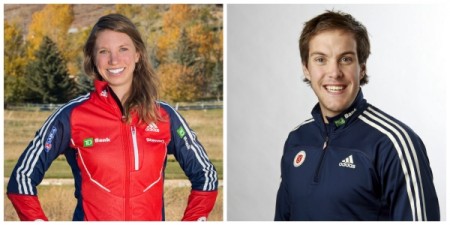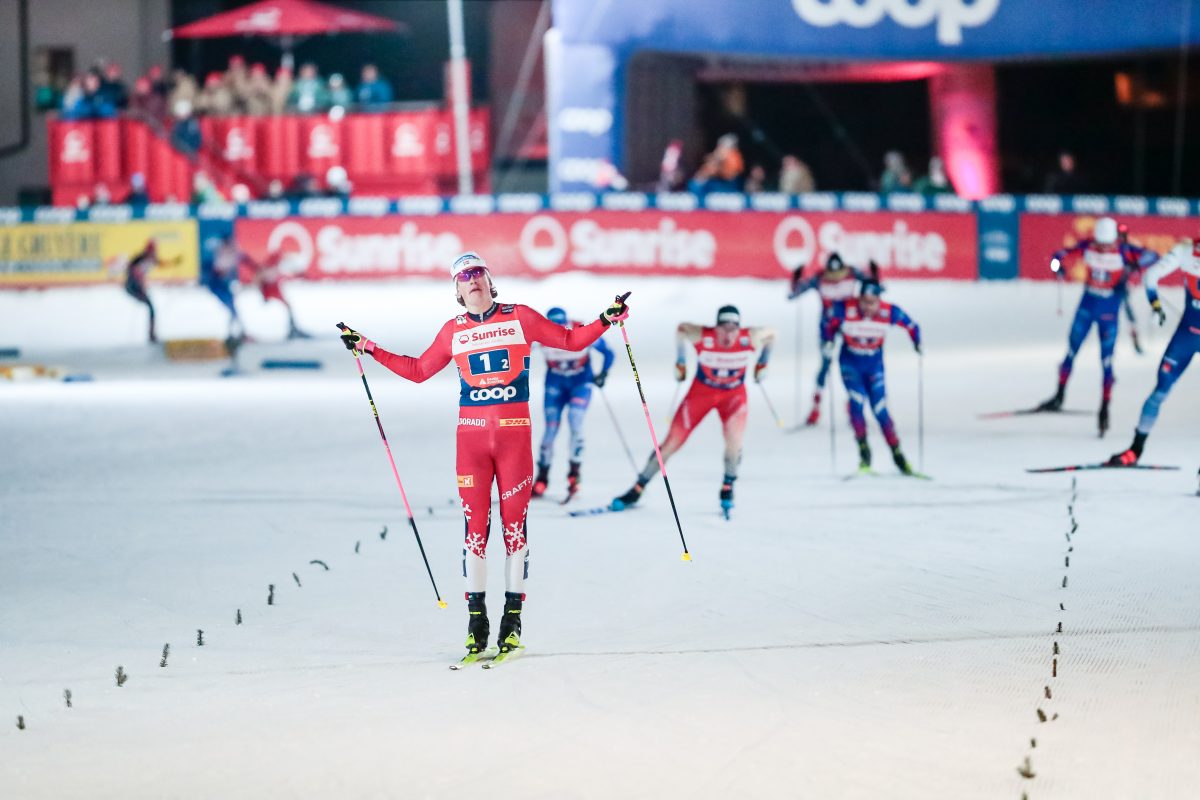
Even though the first period of World Cup racing didn’t go quite as they were hoping, two US athletes qualified for the Olympic biathlon team last week: Annelies Cook and Leif Nordgren, both veterans of multiple World Championships trips.
“I am very excited to see Annelies and Leif qualify for the team,” said Max Cobb, US Biathlon CEO, in a press release.
It’s the first time either American athlete has qualified for the Olympics, a fact that was also not left out of the press release. With three athletes – Tim Burke, Lowell Bailey, and Susan Dunklee – already pre-qualified based on top-15 results from last season, Cook and Nordgren snagged the next available spots by having the best results from this first period of racing. Cook placed 50th in the 15 k individual in Ostersund, Sweden, while Nordgren was 41st in the sprint at the same venue.
None of their other teammates could match those finishes. The remaining two women’s and one men’s spot will be decided at IBU Cup raced in January.
“Qualifying early will take a big burden off their shoulders and now they can focus on executing what they worked hard on during the training season,” said Bernd Eisenbichler, US Biathlon High Performance Director. “Both clearly belong and earned their spots on the team for Sochi.”
Cook echoed the idea the sentiment that qualifying is a huge relief.
“Four years ago, I didn’t make the Olympic team and I didn’t get to go to the IBU Cup and try out,” Cook said. “I was so heartbroken. I sat down in the shower of a hotel room and just cried.”
But this time around, the 29-year-old Saranac Lake, NY native finally has her chance to compete at the 2014 Winter Olympics in Sochi, Russia. She says she’s excited, but when she first found out, she was overwhelmed with a sense of relief.
“When you’re waiting qualify for something, it’s stressful,” said Cook, who was hoping to qualify earlier by having either the two top-15s or a top 30 overall World Cup ranking; last year she came close, with finishes of 14th and 18th (twice). “So, at the beginning of the World Cup, when the goal is to be racing in the top 30, I was not at the point. Then you start to worry a little bit. You’re like ‘ok, so how long is this gonna take?’ and it sits in the back of your head.”
“Once you qualify, it’s a little bit easier to just focus on the task at hand and just race rather than trying to achieve a numerical goal, so now that I’ve qualified, there’s a weight of my shoulders,” she explained. “I can relax a little bit more and focus on taking care of my body. I can fix what’s been going on.”
Cook has had a rough start to the season, so the freedom to focus on fixes will improve her chances in Sochi.
“The first couple World Cups, I was battling some tight shins and calves,” she explained. “You can try to treat the problem but the next day you go out and you race again and so it’s really hard to get on top of it.”
In the last races before Christmas, teams were in France where Cook said she struggled physically.
“The very last race, my back started to spasm and I was hobbling around like a grandma for two days,” she said with a laugh. “I raced with it and then it got even worse.”
She said when she learned she had qualified, she wasn’t hit with the rush of excitement she had expected.
“I found out I made the Olympic team after a really bad race and my back was really hurting me and I was kind of sad because I’ve been troubled by my body the past few World Cups,” she said.
“It was a really funny experience, because instead of having this elation, I felt kind of sad, which was totally weird,” she admitted. “But then also your teammates, they still have the qualifying process to go through, so it’s harder to feel joyous, because you’re not sharing it with the people that you train with all the time.”
Nordgren had a similar experience. The 24-year-old from Marine on St. Croix, Minnesota, knew he was close to qualifying.
“Yeah, so I kind of had a good feeling I was gonna make it based on the way the selection criteria was worded,” he said. “I knew going into the last World Cup races in France that I had a pretty good chance, so I wasn’t completely surprised. I was actually a little bummed to be honest, not that I had made the team but I had kind of crappy races that weekend, so I wasn’t really thinking so much about actually making the team until the flight home and then I started thinking more about it I was pretty relieved and excited.”
Nordgren said he’s still recovering from an upper respiratory cold he caught in Austria, where he sat out every race except the relay, where the U.S. men finished 11th but closer time-wise to the podium than that result implies (lacking his best speed due to the cold, Nordgren lost a group sprint finish for 8th place).
“I would say I’m actually still not 100 percent, which is kind of a drag,” he said. “It usually takes me a good two or three weeks to fully get over a cold like I had.”
He said he plans to spend the next two week or so recovering with family in Minnesota where he will celebrate the holidays, before heading back to Lake Placid for training.
“I am training pretty much full speed like I would normally, so when you do that it’s gonna take the body a little bit longer to recover,” he said. “The big thing will be the travel back to Europe, because the first World Cup there, that always kind of takes a lot out of you and so [I need] to make sure I take that easy and don’t start up too soon after we get back to Europe. That’ll be a the big thing.”
But Nordgren doesn’t think illness will affect his entire season.
“I came into the season feeling really strong and just training with Tim [Burke] and Lowell [Bailey], I was closer to them in training then I had ever been before,” he said of his fellow teammates and veteran Olympians. “So, coming into the first trimester, I was really looking forward to trying to show how much I have improved. Obviously, now I’m look ahead and looking forward to the next trimester and the next part of the season to come.”
Both Nordgren and Cook have competed on the course in Sochi’s before. Nordgren placed 40th in the sprint last year. Cook placed 18th in the individual and 14th in the sprint race on the World Cup last year. She said it’s a relief to know what to expect from the Olympics in February.
“It’s a really, really, really hard course with huge long uphills and really scary downhills and altitude,”Cook explained. “A lot of people seem to freak out and I just think our team always does really well when the conditions are tough.”
She said with four years of training and mental preparation she’s looking forward to Olympics at now that she’s a little older.
“I’m kind of a later bloomer, this is all happening to me later on in life,” she said. “I think its really important to go and race and try to do your best and see what happens.”
Neither say they’ve gotten nervous yet about the Olympic Games.
“But there’s still a lot of time before then, so I’m sure it will come,” said Nordgren.
As for their teammates, neither says they’ve sought any veteran advice year, but Cook also made mention of Tim Burke and Lowell Bailey.
“I get to got to the Olympics with two people I grew up with,” she said; growing up in Saranac Lake, New York, she’s been plugged into the Lake Placid scene her whole life. “That’s really special. There’s a lot of people from my town and my high school that are going to be at the Olympics and its really special because we’re all going to be there together.”
Emily Schwing
Emily Schwing is a public radio reporter in Interior, AK. She normally writes about athletes of the four-legged kind. When she's not chasing dog teams, skiers and local news, she's breaking trail on her rock skis with a dog name Ghost. Follow her on Twitter @emilyschwing



